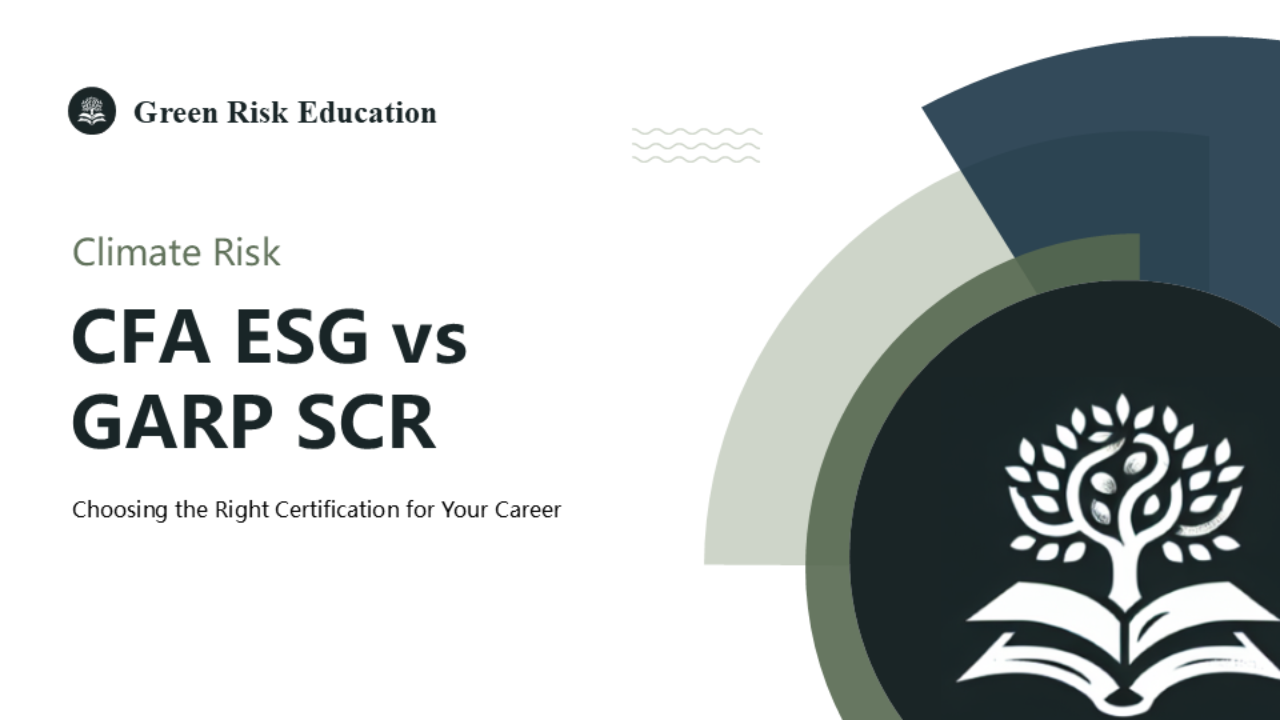As ESG (Environmental, Social, and Governance) considerations gain prominence across industries, certifications in this domain have become increasingly valuable. Among the most recognized options are the Certificate in ESG Investing (CFA ESG) by the CFA Institute and the Sustainability and Climate Risk Certificate (GARP SCR) by the Global Association of Risk Professionals. Both certifications cater to professionals aiming to expand their ESG expertise, but they differ significantly in focus and application. Here's a closer look to help you decide which certification aligns best with your career aspirations.
CFA ESG Investing Certificate
The CFA ESG certificate is widely acknowledged for its comprehensive coverage of ESG principles. It emphasizes integrating ESG factors into investment decision-making, catering primarily to finance professionals, particularly those involved in portfolio management and investment analysis.
Key features of the CFA ESG include:
-
Focus on ESG analysis and integration.
-
Broad coverage of environmental, social, and governance factors.
-
Aimed at helping professionals adapt to evolving investor preferences and regulatory landscapes.
GARP Sustainability and Climate Risk (SCR) Certificate
The GARP SCR, introduced in 2020, emphasizes risk management, particularly concerning climate risk. It aims to equip professionals with the tools to identify, measure, and manage the impacts of climate change on businesses.
Key features of the GARP SCR include:
-
Specialized focus on climate risk and sustainability.
-
Detailed content on climate risk measurement, scenario analysis, and policy implications.
-
Applicable beyond the finance sector, including fields like supply chain, operations, and technology.
Exam Structure and Topics
CFA ESG Exam
-
Duration: 140 minutes
-
Format: 100 multiple-choice questions
-
Study Time: 130 hours recommended
-
Cost: $795 (standard fee), $595 for retakes
-
Content: A balanced approach covering all three pillars of ESG, with modules on climate change, sustainable investing, and regulatory policies.
GARP SCR Exam
-
Duration: 240 minutes
-
Format: 90 multiple-choice questions
-
Study Time: 100-150 hours recommended
-
Cost: $600–$725 (varies by membership status)
-
Content: In-depth exploration of climate risk, with a breakdown as follows:
-
Foundations of Climate Change: What is Climate Change?
-
Sustainability
-
Climate Change Risk
-
Sustainability and Climate Policy, Culture, and Governance
-
Green and Sustainable Finance: Markets and Instruments
-
Climate Risk Measurement and Management
-
Climate Models and Scenario Analysis
-
Net Zero
-
Climate and Nature Risk Assessment
-
Transition Planning and Carbon Reporting
Which Certification is Right for You?
-
Choose GARP SCR if:
-
You work in risk management or sustainability.
-
You need in-depth knowledge of climate risks and their impact on business.
-
You aim to lead initiatives in climate risk measurement and policy implementation.
-
Choose CFA ESG if:
-
You’re an investment professional focused on ESG integration.
-
You want a broader understanding of ESG factors.
-
You aim to cater to the evolving preferences of investors and regulators.
Conclusion
Both the CFA ESG and GARP SCR certifications are excellent choices for professionals looking to enhance their ESG credentials. The decision ultimately comes down to your career focus—whether it’s sustainable investing or managing climate risks. With increasing ESG touchpoints across industries, earning either certification can position you as a leader in this evolving field.
FAQs
-
Is GARP SCR worth it for non-finance professionals?
Yes, its focus on climate risk and sustainability makes it relevant for roles beyond finance, including operations and technology.
-
Which is easier to pass?
Both are manageable with adequate preparation. Your background in the respective topics will likely influence the perceived difficulty.
-
Can ESG certifications boost your career?
Absolutely. ESG skills are increasingly in demand across finance, consulting, and corporate sustainability roles.
